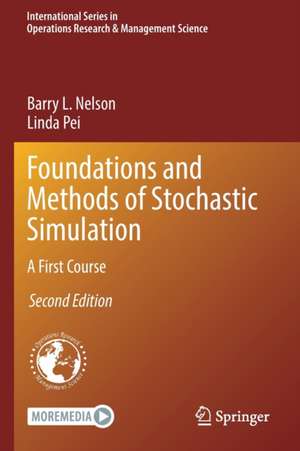Foundations and Methods of Stochastic Simulation: A First Course: International Series in Operations Research & Management Science, cartea 316
Autor Barry L. Nelson, Linda Peien Limba Engleză Paperback – 12 noi 2022
| Toate formatele și edițiile | Preț | Express |
|---|---|---|
| Paperback (1) | 459.35 lei 22-36 zile | +21.38 lei 6-12 zile |
| Springer International Publishing – 12 noi 2022 | 459.35 lei 22-36 zile | +21.38 lei 6-12 zile |
| Hardback (1) | 704.87 lei 43-57 zile | |
| Springer International Publishing – 11 noi 2021 | 704.87 lei 43-57 zile |
Din seria International Series in Operations Research & Management Science
- 20%
 Preț: 331.25 lei
Preț: 331.25 lei - 9%
 Preț: 696.06 lei
Preț: 696.06 lei - 20%
 Preț: 570.62 lei
Preț: 570.62 lei - 18%
 Preț: 1132.02 lei
Preț: 1132.02 lei - 18%
 Preț: 773.72 lei
Preț: 773.72 lei -
 Preț: 170.40 lei
Preț: 170.40 lei - 17%
 Preț: 360.48 lei
Preț: 360.48 lei -
 Preț: 263.40 lei
Preț: 263.40 lei - 24%
 Preț: 905.31 lei
Preț: 905.31 lei - 17%
 Preț: 460.09 lei
Preț: 460.09 lei - 17%
 Preț: 459.35 lei
Preț: 459.35 lei - 20%
 Preț: 631.58 lei
Preț: 631.58 lei - 13%
 Preț: 480.01 lei
Preț: 480.01 lei - 18%
 Preț: 738.28 lei
Preț: 738.28 lei - 18%
 Preț: 1225.94 lei
Preț: 1225.94 lei - 18%
 Preț: 948.92 lei
Preț: 948.92 lei - 18%
 Preț: 703.88 lei
Preț: 703.88 lei - 18%
 Preț: 957.44 lei
Preț: 957.44 lei - 15%
 Preț: 651.84 lei
Preț: 651.84 lei - 20%
 Preț: 336.21 lei
Preț: 336.21 lei - 15%
 Preț: 641.03 lei
Preț: 641.03 lei -
 Preț: 404.29 lei
Preț: 404.29 lei - 18%
 Preț: 950.21 lei
Preț: 950.21 lei - 15%
 Preț: 649.06 lei
Preț: 649.06 lei - 18%
 Preț: 725.75 lei
Preț: 725.75 lei -
 Preț: 394.12 lei
Preț: 394.12 lei - 18%
 Preț: 951.47 lei
Preț: 951.47 lei - 15%
 Preț: 639.59 lei
Preț: 639.59 lei - 18%
 Preț: 773.06 lei
Preț: 773.06 lei - 18%
 Preț: 889.29 lei
Preț: 889.29 lei - 15%
 Preț: 655.60 lei
Preț: 655.60 lei - 15%
 Preț: 640.06 lei
Preț: 640.06 lei
Preț: 459.35 lei
Preț vechi: 553.43 lei
-17% Nou
Puncte Express: 689
Preț estimativ în valută:
87.91€ • 91.44$ • 72.57£
87.91€ • 91.44$ • 72.57£
Carte disponibilă
Livrare economică 24 martie-07 aprilie
Livrare express 08-14 martie pentru 31.37 lei
Preluare comenzi: 021 569.72.76
Specificații
ISBN-13: 9783030861964
ISBN-10: 3030861961
Pagini: 313
Ilustrații: XVI, 313 p. 65 illus., 9 illus. in color.
Dimensiuni: 155 x 235 x 24 mm
Greutate: 0.47 kg
Ediția:2nd ed. 2021
Editura: Springer International Publishing
Colecția Springer
Seria International Series in Operations Research & Management Science
Locul publicării:Cham, Switzerland
ISBN-10: 3030861961
Pagini: 313
Ilustrații: XVI, 313 p. 65 illus., 9 illus. in color.
Dimensiuni: 155 x 235 x 24 mm
Greutate: 0.47 kg
Ediția:2nd ed. 2021
Editura: Springer International Publishing
Colecția Springer
Seria International Series in Operations Research & Management Science
Locul publicării:Cham, Switzerland
Cuprins
Chapter 1: Why Do We Simulate.- Chapter 2: Simulation Programming: Quick Start.- Chapter 3: Examples.- Chapter 4: Simulation Programming with PythonSim.- Chapter 5: Three Views of Simulation.- Chapter 6: Simulation Input.- Chapter 7: Simulation Output.- Chapter 8: Experiment Design and Analysis.- Chapter 9: Simulation Optimization and Sensitivity.- Chapter 10: Simulation for Research.- References.- Index.
Notă biografică
Barry L. Nelson is the Walter P. Murphy Professor in the Department of Industrial Engineering and Management Sciences at Northwestern University, US. His research expertise is in the design and analysis of computer simulation experiments on models of stochastic systems, focusing particularly on statistical efficiency and simulation optimization. His application domains include computer-performance modelling, manufacturing systems, financial engineering and transportation. He is a Fellow of INFORMS and IISE.
Linda Pei is a senior Ph.D. student in the Department of Industrial Engineering and Management Sciences at Northwestern University, US. Her research interests are simulation optimization and data science. She designed and developed Python programs for large-scale parallel simulation optimization and was named the Outstanding Teaching Assistant in the department.
Linda Pei is a senior Ph.D. student in the Department of Industrial Engineering and Management Sciences at Northwestern University, US. Her research interests are simulation optimization and data science. She designed and developed Python programs for large-scale parallel simulation optimization and was named the Outstanding Teaching Assistant in the department.
Textul de pe ultima copertă
This graduate-level textbook covers modelling, programming and analysis of stochastic computer simulation experiments, including the mathematical and statistical foundations of simulation and why it works. The book is rigorous and complete, but concise and accessible, providing all necessary background material. Object-oriented programming of simulations is illustrated in Python, while the majority of the book is programming language independent. In addition to covering the foundations of simulation and simulation programming for applications, the text prepares readers to use simulation in their research. A solutions manual for end-of-chapter exercises is available for instructors.
Caracteristici
Contains a modern treatment of simulation optimization Provides specific training in modelling, programming and analysis using Python Examines mathematical and statistical foundations of stochastic simulation
